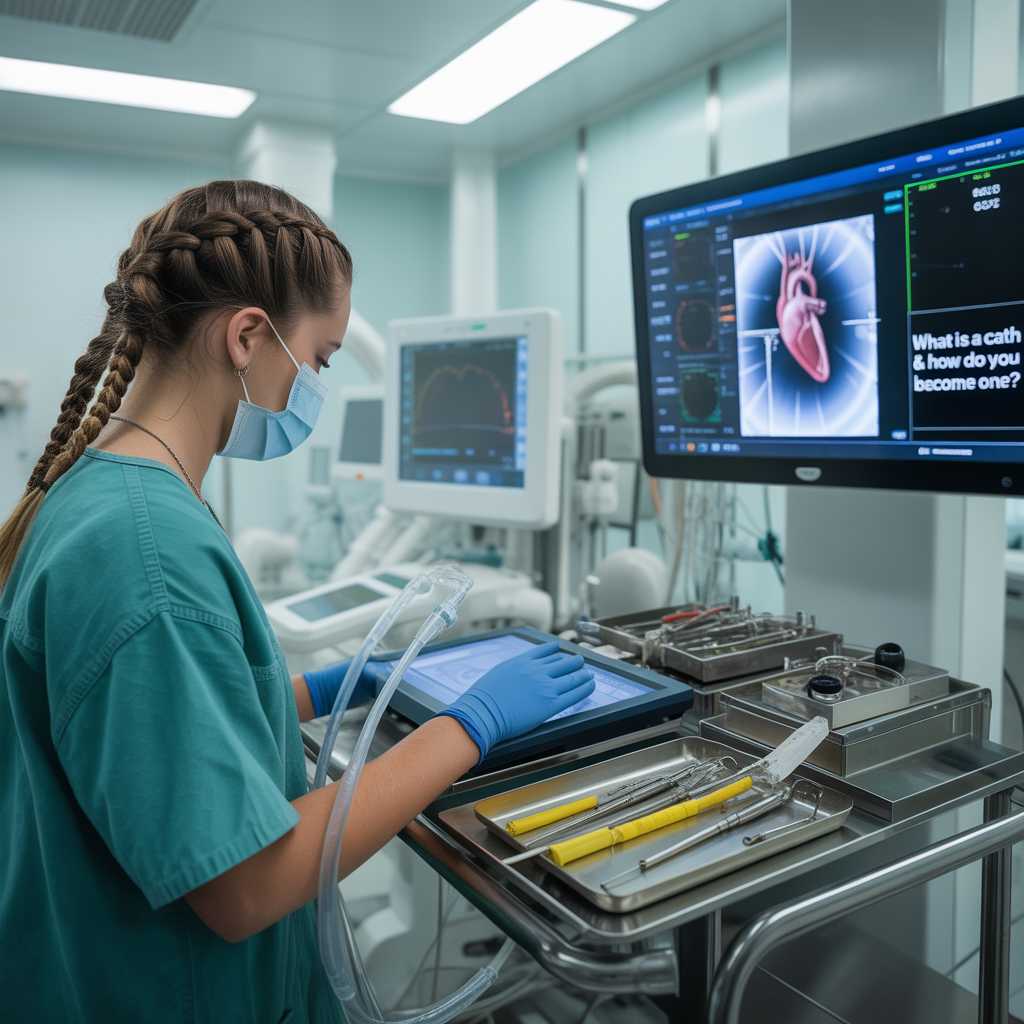The world of modern medicine is filled with highly specialized roles, many of which are unknown to the general public yet are critical for saving lives. Among these unsung heroes is the cath lab tech, a professional at the heart of cardiovascular care. These specialists operate advanced technology in high-stakes environments to help physicians diagnose and treat heart conditions.
This guide provides a comprehensive overview of the cath lab technician profession. You will learn about their essential responsibilities, the education and certifications required, and the unique challenges and rewards of the job. If you are a student exploring medical careers or a healthcare worker considering a specialization, this article will help you understand what it takes to succeed in this dynamic and vital field.
Understanding the Cath Lab
A catheterization laboratory, or cath lab, is a specialized examination room in a hospital or clinic equipped with advanced diagnostic imaging systems. It’s where minimally invasive tests and procedures are performed to diagnose and treat cardiovascular diseases.
While it may sound like a standard operating room, a cath lab is distinct. Operating rooms are designed for open surgeries, whereas cath labs focus on minimally invasive procedures performed using catheters. This approach often leads to shorter recovery times and reduced risk for patients.
Procedures commonly performed in a cath lab include:
- Diagnostic Angiography: An imaging test that uses X-rays to check your blood vessels.
- Angioplasty and Stent Placement: A procedure to open blocked or narrowed coronary arteries, often involving placing a small mesh tube called a stent to keep the artery open.
- Electrophysiology (EP) Studies: Tests that help doctors understand and map the electrical activity of the heart to diagnose abnormal heartbeats or arrhythmias.
- Structural Heart Procedures: Interventions to repair congenital or acquired structural heart defects, such as valve replacements.
Who Is a Cath Lab Tech?
A cath lab tech is a highly skilled allied health professional who works alongside cardiologists and nurses. While “cath lab tech” is a common term, official job titles can vary. You might see listings for Cardiovascular Technologist, Cardiac Catheterization Technologist, or Cardiovascular Invasive Specialist.
The core cath lab tech responsibilities involve a blend of patient care, technical expertise, and teamwork. Key duties include:
- Preparing Patients and Equipment: They ensure patients are ready for the procedure and that all necessary equipment is sterilized and functioning correctly.
- Assisting Physicians: During procedures, they assist the cardiologist by passing instruments, operating imaging equipment, and monitoring the patient’s condition.
- Monitoring Vital Signs: They constantly monitor the patient’s heart rate, blood pressure, and other vital signs, alerting the team to any changes.
- Ensuring Safety: A crucial part of the role is maintaining a sterile environment and adhering to radiation safety protocols to protect both the patient and the medical team.
Cath lab techs are vital members of a collaborative team. They work in a dynamic environment where clear communication with doctors, nurses, and radiology staff is essential for successful patient outcomes.
Education and Training Requirements
The path to becoming a cath lab tech requires a specific educational background and specialized training. Here are the typical cath lab tech education requirements.
Foundational Education
A strong foundation in science and math during high school is highly recommended. After graduation, aspiring techs typically pursue a college degree. The most common routes are an Associate’s or Bachelor’s degree in a relevant field, such as:
- Cardiovascular Technology
- Radiologic Technology (Radiography)
- Nursing (RN)
Specialized Training
Following their degree, individuals must complete specialized training in invasive cardiology. This is often part of the degree program, which includes hands-on clinical rotations in a functioning cath lab. This clinical experience is where students learn to apply their theoretical knowledge in a real-world setting.
Certification Requirements
Certification is a critical step that validates a tech’s skills and knowledge. The primary certification for this field is the Registered Cardiovascular Invasive Specialist (RCIS), offered by Cardiovascular Credentialing International (CCI).
In addition to the RCIS, most employers require cath lab techs to hold:
- Basic Life Support (BLS) certification
- Advanced Cardiac Life Support (ACLS) certification
Because the field is constantly evolving, cath lab techs must also engage in continuing education to maintain their certifications and stay current with the latest technologies and procedures.
Skills and Qualities of a Successful Cath Lab Tech
Beyond formal education and certification, a successful cath lab tech needs a unique blend of technical and personal skills.
- Technical Proficiency: A deep understanding and ability to operate complex imaging and monitoring equipment is non-negotiable.
- Anatomical Knowledge: Expert knowledge of cardiac anatomy and physiology is essential to assist physicians effectively.
- Attention to Detail: In a high-stakes environment, even the smallest detail matters. Precision and focus are critical.
- Problem-Solving Skills: Procedures don’t always go as planned. Techs must be able to think on their feet and help troubleshoot issues.
- Grace Under Pressure: Cath labs are often high-stress environments, especially during emergencies. The ability to remain calm and focused is a vital trait.
- Communication and Teamwork: As a core member of the cath lab team, clear and concise communication is necessary to ensure patient safety and procedural success.
- Compassion: Patients undergoing cath lab procedures are often anxious. A compassionate and reassuring demeanor can make a significant difference in their experience.
A Day in the Life of a Cath Lab Tech
What does a typical day look like for a cath lab tech? The answer varies, but it’s almost always fast-paced and unpredictable. Many techs work regular daytime hours, but they are also often required to be on-call for nights, weekends, and holidays to handle emergencies like heart attacks.
A day might involve:
- Pre-procedure Duties: Starting the day by preparing the lab, checking equipment, and reviewing the schedule of procedures.
- During Procedures: Assisting the cardiologist with scheduled diagnostic and interventional cases, monitoring the patient, and managing the imaging equipment.
- Handling Emergencies: Responding swiftly when a heart attack patient is rushed to the lab, requiring immediate intervention.
- Post-procedure Duties: Cleaning and sterilizing the lab, documenting procedural data, and ensuring patients are stable before being transferred to a recovery unit.
One of the biggest challenges is the high-stress nature of the job. You are often dealing with life-or-death situations, which requires mental and emotional resilience.
Salary and Career Outlook
A career as a cath lab tech offers strong earning potential and job security. The cath lab tech salary can vary based on experience, location, and certifications. According to recent data, the average salary for a Cardiovascular Technologist in the United States is around $67,000 per year, with experienced professionals earning significantly more.
The career outlook is also very positive. With an aging population and a high prevalence of heart disease, the demand for skilled cath lab techs is projected to grow much faster than the average for all occupations.
Career growth opportunities include:
- Lead Cath Lab Tech or Supervisor: Managing a team of technologists.
- Cath Lab Manager: Overseeing the entire operations of the lab.
- Clinical Educator: Training the next generation of cath lab techs.
- Industry Roles: Working for medical device companies as a clinical specialist.
Start Your Career as a Cath Lab Tech
If a challenging, rewarding, and high-impact career in healthcare appeals to you, becoming a cath lab tech is an excellent choice. You will be on the front lines of cardiac care, using cutting-edge technology to make a direct difference in patients’ lives. The path requires dedication, but the professional and personal rewards are immense.
Frequently Asked Questions
What is the difference between a cath lab tech and a radiology tech?
While both roles involve imaging technology, a radiology tech performs a wide range of diagnostic imaging (X-rays, CT scans, MRIs) across the body. A cath lab tech is a specialist who focuses exclusively on cardiovascular imaging and assists in minimally invasive procedures within the cath lab.
Do cath lab techs perform surgery?
No, cath lab techs do not perform surgery. They assist invasive cardiologists, who are the physicians performing the procedures. Their role is to operate the equipment, monitor the patient, and provide technical support.
How long does it take to become a certified cath lab tech?
Typically, it takes two to four years to become a cath lab tech. This includes completing an accredited associate’s or bachelor’s degree program and gaining the clinical experience required to sit for the RCIS certification exam.
Is being a cath lab tech a stressful job?
Yes, it can be a very stressful job. Techs often work in high-pressure situations, dealing with critically ill patients and life-threatening emergencies. The need for precision and the on-call responsibilities can also add to the stress.
What are the most rewarding aspects of this career?
Many cath lab techs find immense satisfaction in knowing their work directly contributes to saving lives. Seeing a patient recover after a successful procedure, being part of a highly skilled team, and working with advanced technology are also cited as major rewards.
Cath lab techs play a crucial role in life-saving procedures, managing high-pressure situations while finding fulfillment in patient recovery, teamwork, and cutting-edge technology.
Meta Data
Meta title
What Is a Cath Lab Tech? A Guide to This Vital Career
Meta description
Learn what a cath lab tech does, the education required, salary expectations, and how to start your career in this essential healthcare field.




